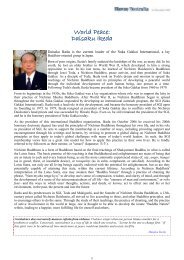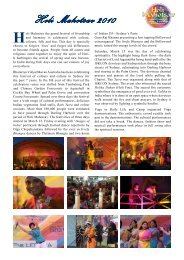Issue 8.5 - Bharatiya Vidya Bhavan Australia
Issue 8.5 - Bharatiya Vidya Bhavan Australia
Issue 8.5 - Bharatiya Vidya Bhavan Australia
Create successful ePaper yourself
Turn your PDF publications into a flip-book with our unique Google optimized e-Paper software.
Meat and the<br />
Environment<br />
“By eliminating beef from the human diet, our<br />
species takes a significant step toward a new species<br />
consciousness, reaching out in a spirit of shared<br />
partnership with the bovine, and, by extension, other<br />
sentient creatures with whom we share the earth.” 1<br />
Beyond Beef, Jeremy Rifkin<br />
Killing animals for food, fur, leather, and cosmetics is<br />
one of the most environmentally destructive<br />
practices tak¬ing place on the earth today. The Krsna<br />
consciousness movement’s policies of protecting<br />
animals, especially cows, and broadly promoting a<br />
spiritual vegetarian diet could—if widely adopted—<br />
relieve many environmental problems.<br />
These policies are rooted in the following<br />
philosophical and functional principles:<br />
1. Humans should not slaughter animals for food.<br />
They should be as compassionate to cows and<br />
other farm animals as they are to their pet dogs<br />
and cats. Nonviolence extended beyond human<br />
society is known as ahimsa, an ancient Vedic<br />
principle still practiced in some parts of the world.<br />
2. Cows are the most valuable animals to human<br />
society. They give us fuel, fertilizer, power (for<br />
tilling, transport, grinding, and irrigating), milk and<br />
milk products, and leather (after natural death).<br />
3. The killing of animals violates karmic laws,<br />
creating col¬lective and individual reactions in<br />
human society.<br />
4. Well-documented medical studies show that<br />
flesh-eating is harmful to health.<br />
5. Mass animal-killing for food and fashion erodes<br />
mercy, reducing respect for all kinds of life,<br />
including human life.<br />
30 | <strong>Bhavan</strong> <strong>Australia</strong> | Nov 2010<br />
6. Meat diets are more expensive than nonmeat diets.<br />
7. If the world switched to a nonmeat diet, it could<br />
radically increase its food output and save millions<br />
of people from hunger, starvation, and death.<br />
8. Massive animal slaughter is destroying the<br />
environment. We shall now document this<br />
destruction, keeping in mind that it amounts to<br />
violence against the earth. It also has karmic<br />
consequences.<br />
The meat industry is linked to deforestation,<br />
desertification, water pollution, water shortages,<br />
air pollution, and soil erosion. Neal D. Barnard,<br />
President of the Physicians Committee for<br />
Responsible Medicine (USA), therefore says, “If<br />
you’re a meat eater, you are contributing to the<br />
destruction of the environ¬ment, whether you<br />
know it or not. Clearly the best thing you can do for<br />
the Earth is to not support animal agriculture.” 2<br />
And Jeremy Rifkin warns in his widely read book<br />
Beyond Beef: “Today, millions of Americans,<br />
Europeans, and Japanese are consuming countless<br />
hamburgers, steaks, and roasts, oblivi¬ous to the<br />
impact their dietary habits are having on the<br />
biosphere and the very survivability of life on<br />
earth. Every pound of grain-fed flesh is secured at<br />
the expense of a burned forest, an eroded<br />
rangeland, a barren field, a dried-up river or<br />
stream, and the release of millions of tons of<br />
carbon dioxide, nitrous oxide, and methane into<br />
the skies.” 3<br />
Forest Destruction<br />
According to Vegetarian Times, half of the annual<br />
destruction of tropical rainforests is caused by<br />
clearing land for beef cattle ranches. 4 Each pound









